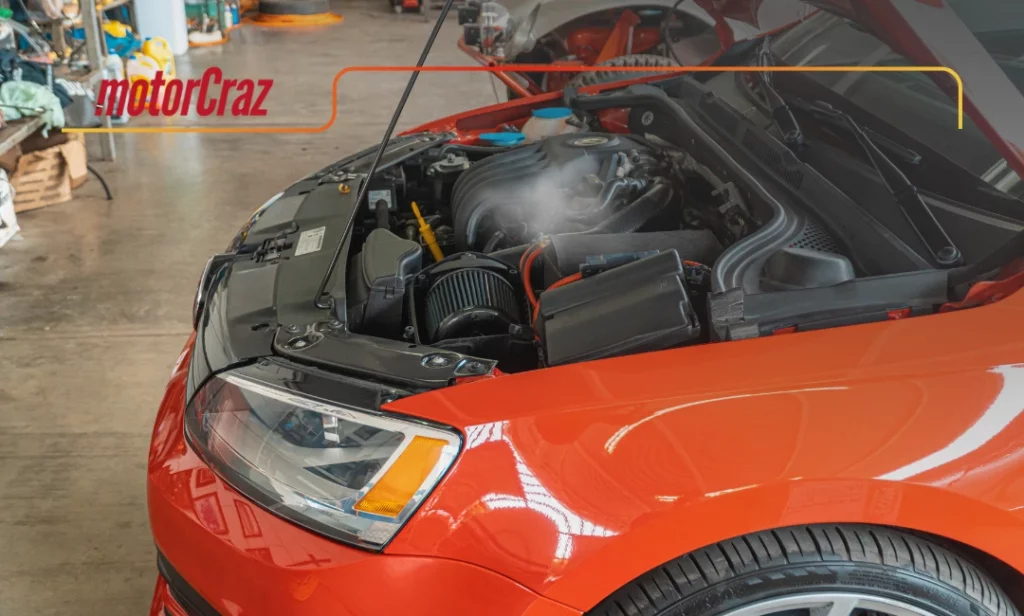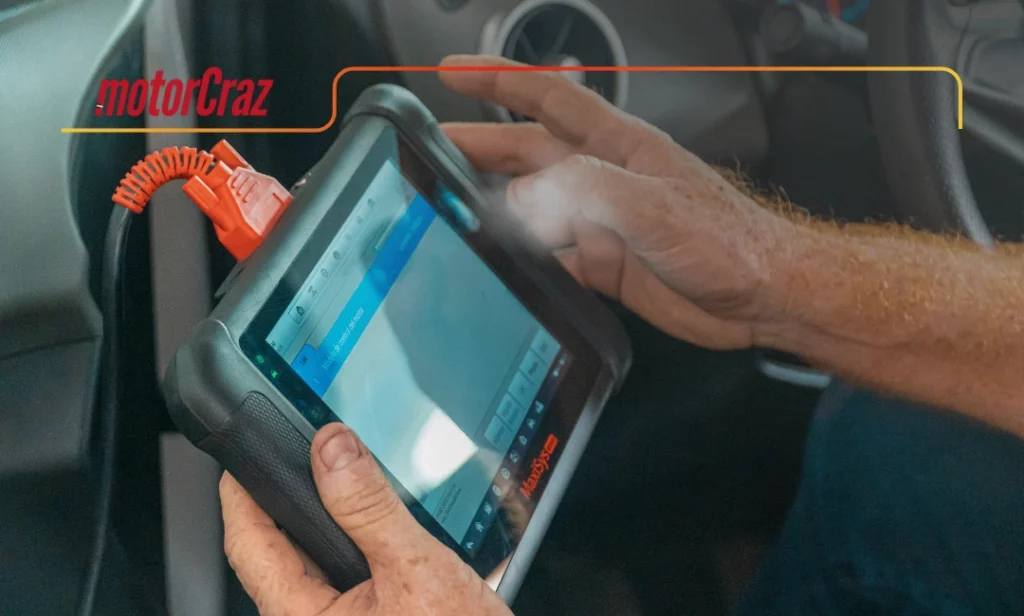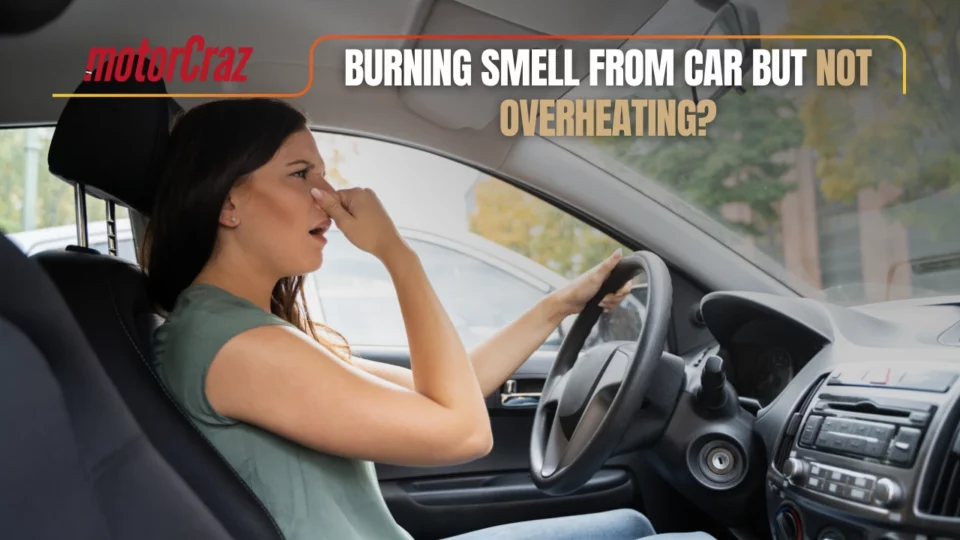Have you noticed a burning smell from car but not overheating when you examine the temperature gauge? Well, you are not alone. Almost every driver faces this situation at least once. While it may not be life-threatening, it is still serious.
The burning smell coming from the car but not overheating is often a sign of something serious going under the hood that does not involve engine overheating.
A burning odor without an obvious sign, especially the rising engine temperature, can be a result of anything from oil spillage and leakage on a hot intake manifold to a stuck brake caliper or electrical wiring issues.
In all these scenarios, your engine might stay cool, but that stink is a sign that something is not right. If you are dealing with this issue time and time again, this guide is here to help.
MotorCraz will walk you through what that stinking smell could be, what parts to check, and when to look for a professional. We’ll also answer popular questions people ask on Reddit and car forums, so you’re armed with real info, not guesswork.
What Does a Burning Smell Without Overheating Actually Mean?
If there is a burning smell coming from your car but there are no signs of overheating, it typically means a component other than the engine, like belts, oil, clutch, brakes, or wires, is generating excessive heat or friction.
The intriguing thing is that this can happen even if your cooling system is functioning properly. Confused? Let me explain it with a different analogy.
Think of your car as your kitchen. Just because the oven isn’t on doesn’t mean something isn’t burning on the stovetop. Similarly, in a car, not all burning smells are tied to engine temperature. Several reasons are causing that rotten smell, which we will explore next.
Common Causes of Burning Smell From a Car Engine But Not Overheating

If your car smells like something is burning but the temperature gauge is normal, there a high chances this is not due to engine overheating. It is highly common for another component of your car to heat up or malfunction and cause a noticeable burning odor. From slipping belts to leaking fluids, several non-heating culprits can cause that sharp, chemical, or rubbery odor, even when your coolant and engine temp are just fine.
Here we have some of the most common reasons your car might give off that worrisome smell without showing any signs of running hot.
1. Belts, Hoses, or Tires
If you are smelling a burning rubber odor, it usually comes from slipping drive belts, loose hoses rubbing against hot parts, or even overheated tires after a long drive.
Over time, the serpentine belts wear down and start slipping, especially in older models. When this happens, the belts heat up fast and release that classic burnt rubber odor. Another possibility is that there might be a loose engine hose making direct contact with a hot component like the exhaust.
The best way to find out is that if you hear squeaking or screeching while starting the engine along with the smell of burning rubber, check the serpentine belt tension and condition.
2. Leaks on Hot Engine Parts
When oil or transmission fluid leaks onto a hot engine block or exhaust manifold, it cooks off, and you get that harsh burning oil or fluid smell without any overheating symptoms.
This is highly common in vehicles with older or damaged valve cover gaskets. The leak may be small, but the smell can definitely be strong. To know for sure, look for oil spillage or leakage under your car after parking. Also, if you find smoke rising in your engine without a temperature spike, there is 100% oil or fluid leak.
3. Overuse or Misuse (manual cars)
If you drive a manual car, you may come across a distinct burnt-paper smell that often points to a slipping or overheated clutch. It’s especially noticeable during stop-and-go traffic or when you are learning to drive a manual.
This burning smell without overheating is not just annoying. It is a clear sign that your clutch is wearing out prematurely. Feeling the smell once or twice is normal. However, if you smell it regularly, have the clutch inspected before it fails completely.
Also Read: What Car Is Lightning McQueen Based Off? Real-Life Inspiration
4. Stuck Caliper or Dragging Pads
If you smell a sharp burning odor after driving, especially around the wheels, it is an indicator that a stuck brake caliper or pad is dragging. Even if your temperature gauge is showing a normal reading, the overheated brakes can produce a strong smell and even make the car shake or vibrate under braking.
We recommend feeling each wheel of your car carefully after every drive. If anyone is significantly hotter, that is the problem area causing that burning smell from the car but not overheating and the car is shaking.
5. Electrical Short or Overheated Wiring
The most alarming smell you can encounter within your car is burning or melted plastic or electronics. It might be coming from inside the dashboard or fuse box and should not be taken lightly.
Wiring issues, like frayed insulation or a shorted blower motor resistor, can cause localized overheating. Generally, this will be noticeable when you turn on the heater or AC.
Electrical smells are a fire risk. Have your vehicle checked out as soon as you notice the smell. Delaying will only make driving unsafe for you.
6. Dust, Debris, or Heater Core Leak
Another indication that your engine is not the culprit behind that awful stink is that there is a burning smell from car vents, but no overheating signs.
The burning smell from the car when heat is on indicates that there may be dust or debris burning off the heater core. In some cases, it is a failing heater core leaking coolant, often accompanied by a sweet, syrupy smell.
Mechanic-trusted source Community Auto notes this is especially common in colder months when heaters first get used. One user on Reddit mentioned that: “My Civic had a burning smell only when idling with heat on. It turned out to be a small heater core leak dripping onto the cabin air filter.”
This is an issue that you can handle easily by cleaning the vents properly.
7. Residual Heat or Oil on Exhaust
If you notice a burning smell from car when parked or after you shut the engine off, it usually means oil or transmission fluid has dripped onto a hot exhaust component while driving and is still burning off.
Sometimes, there can be an exterior item or debris stuck in between the spaces, causing the odor. One car owner on an online forum shared: “The burning smell after highway driving turned out to be leaves caught near the exhaust manifold.”
Also Read: The Difference Between 6 Speed vs. 5 Speed Manual Transmission
DIY Inspection Checklist to Safely Track Down That Burning Smell

You don’t need to be a certified mechanic to do some basic checks when your car smells like something’s burning. All it takes is a careful approach, a good nose, and a little patience. Here’s a step-by-step guide you can follow to investigate the issue on your own safely:
Pop the hood
Once you start noticing the burning smell, pull over in a safe place, turn off the engine, and open the hood. Let the heat settle, then cautiously sniff around the engine bay.
We recommend focusing on areas around belts and pulleys, exhaust manifolds, fuse boxes, and wiring. A slipping or worn serpentine belt, leaking oil or coolant, and disrupted electrical components can cause a hot rubber or burning plastic-like smell.
However, always remember to never touch any hot components. Use a flashlight to inspect visually, not your fingers.
Check the Wheels for Excessive Heat
If you smell something burning while moving, carefully check each wheel by hovering your hand near the rims. If one wheel is noticeably hotter than the others, that could indicate:
- A stuck brake caliper
- Dragging brake pads
- An overheated bearing or rotor
This is a common issue when the smell is strongest after stopping the car or parking.
Look Under the Car for Fluid Leaks
Slide a flashlight under your vehicle and scan for wet spots or drips and burnt patches. If you find any spots or puddles, there is a fluid leak that keeps coming in contact with hot engine or exhaust parts, causing the smell.
Also, check your driveway or garage floor for any dark or shiny puddles that weren’t there before. This will provide total surety on the matter.
Smell Inside the Cabin and Vents
Turn the ignition to accessory mode and cycle through the heater and A/C systems. Pay attention to the smell coming from the vents. A sweet, syrupy smell could point to a leaking heater core, whereas a burnt plastic odor may signal an electrical issue behind the dash. And if you find a musty or smoky smell, it could indicate debris or mold in the HVAC system.
Take a not-on-smell intensity with the heat on. If it increases, the heater core of the blower motor resistor might be the culprit.
Scan for Debris or Foreign Material
Foreign materials like leaves, plastic bags, or even rodent nests can easily get caught in the engine bay, near or on the exhaust system, and inside the cabin air intake (near the windshield). These items burn or melt when the car gets hot, releasing strong odors. If you recently parked in a grassy area or under trees, this is worth checking.
Inspect Belts and Hoses
Visually check the condition of your serpentine belt and rubber hoses. Look for glazing (shiny spots), cracks, or fraying edges around the serpentine belt, and ensure the rubber hoses are not swollen, soft, brittle, or touching hot components.
A slipping belt will often give off a burnt rubber smell, especially during acceleration or when starting the car.
These steps allow you to inspect each region of your car that can cause a burning smell but do not overheat your car. If you come across any signs indicating wear or tear, fix it ASAP.
Also, for hard-to-see areas like behind the engine or under heat shields, a cheap mechanic’s mirror (or smartphone on selfie mode) can help spot leaks or debris.
When to See a Mechanic
Not all burning smells coming from your car require a trip to an auto repair shop. Some issues, like low fluid levels, or debris stuck at bay, can be handled at home. However, some red flags indicate you need professional assistance.
- Persistent burning smell every time you drive.
- Burning smell with car shaking, jerking, or stalling.
- Electrical smells or visible melted wires.
- Brake-related smells and wheel-pulling.
- Leaking oil or puddles that return repeatedly.
If you find any of these signs, avoid driving your car and book a visit with a trusted and certified technician. Delaying will only increase the damage and cost you far more than you had anticipated.
How to Prevent Burning Smells from Returning

Once you’ve solved the mystery behind a burning smell in your car, the next best move is to make sure it doesn’t come back. Many of the most common causes are totally preventable with some simple maintenance habits and attention to detail. Here’s how to stay ahead of the issue and keep your ride running clean (and smell-free):
Replace Belts and Hoses Regularly
Worn or slipping belts are one of the most common reasons cars smell like burning rubber. Most modern serpentine belts are designed to last around 60k–100k miles, but they can wear out earlier if exposed to oil leaks or poor tension.
The best thing you can do is opt for preventive replacement. Replace your serpentine belts and hoses every 60,000 to 100,000 miles. This is way cheaper than waiting for a roadside breakdown or worse engine damage.
Keep Your Engine Bay Clean and Debris-Free
Leaves, twigs, grass, or even plastic bags can sneak their way into the engine bay or near your exhaust system. When your car heats up, these items can smolder or burn, causing intense odors and in some cases even fire hazards.
To avoid this, check your engine regularly for any debris and clean it properly. For better cleaning, use compressed air to blow out leaves stuck behind grilles or vent openings.
We recommend washing the engine bay once or twice a year. This task can be tricky so you can use professional assistance to avoid any electrical damage. A clean engine is a cooler, safer, and longer-lasting one.
Double-Check Wiring After Modifications or Repairs
One of the most overlooked causes of burning smells is faulty or improperly installed wiring, especially after adding aftermarket accessories like sound systems, lighting, or remote starters. You can prevent it by always using a fused power line when tapping into electrical systems. Also, avoid wrapping wires too close to heat sources (like the exhaust or radiator).
If you are not confident in car wiring, always get help from a qualified auto electrician. Burnt wire insulation smells sharp and acrid and can quickly lead to electrical fires or shorts.
Fix Fluid Leaks Early
Oil and transmission fluid leaks that drip onto hot engine parts are a major cause of burning smells. Even a tiny leak can sizzle in contact with the exhaust or manifold, creating strong odors without triggering a check engine light. These leaks always get worse. Thus, always keep a close eye on fluid spots where you park your ride. If you find any leak, no matter how minor, repair the part quickly.
If you wait for leaks, it can cost you more than repairs. A minor leak ignored over time can ruin catalytic converters, oxygen sensors, and other expensive components.
Rodent-Proof Your Car
Mice and rats love warm engine compartments and can build nests in tight spaces. This is a highly likely occurrence if you park or store your car outside for long periods. Their nesting materials and chewed wires can burn or short out, creating odors and fire hazards.
The best way to deal with it is to use peppermint oil spray or commercial rodent deterrents under the hood. Also, try to park your vehicle in a garage when possible.
I have seen entire wiring harnesses destroyed by mice, costing car owners thousands. One of my neighbors got a mouse stuck in his brand-new crossover. It cost him about $1000 for engine cleaning and changing all the wiring.
Frequently Asked Questions
Why does my car smell like burning, but not overheat?
If you are smelling an awful odor in your vehicle but there is no sign of a rise in engine temperature, it means other components like belts, oil, brakes, or wiring are generating heat. It is not a coolant issue.
Is it safe to drive with a burning smell but no smoke?
Not always. There can be several reasons why you smell a burning stink in your car if there is no smoke. You can not pinpoint the severity just by the smell. It can be anything from fluid leaks or brake drag that can quickly become dangerous. Thus, it is wise to inspect the car thoroughly, find the culprit, and then apply the fix.
Why is there a burning smell from the car when starting?
If you have a burning smell when starting your car, it is usually caused by heat-sensitive components, like belts, wires, or dust on the engine, reacting to the sudden surge of power or friction. This odor is often brief but shouldn’t be ignored, especially if it happens frequently.
Can I fix the burning smell from the car myself?
It depends on the reason causing the smell. If it is something like cleaning debris or inspecting belts, you can do them under your DIY tasks. However, many complex issues like electrical or fluid-related need professional assistance.
Final Thoughts
No matter how busy you are, never ignore the burning smell from your car but no overheating signs. Your nose is one of the best early-warning systems your car has. Use it wisely. Ignoring will only deteriorate your car’s health, causing severe consequences like a damaged engine, brake failure, car accident, and more.
From personal experience, I can tell you that it is always better and cheaper to act early than wait for smoke, warning lights, battery shutdown, or a tow truck.

